The message for 2024 is that the man on the street is not going to be euphoric if the G-20 crowns Modi as king-emperor for 2023, or if India sends its first man to space just ahead of the Lok Sabha polls.
Even a 'temple consecration' in Ayodhya, or a Uniform Civil Code, or both of them together, may not have enough electoral purchase if fuel and commodity prices are not rolled back, and money-in-the-pocket does not fatten, points out N Sathiya Moorthy.

As much as the Bharatiya Janata Party's seventh straight victory in Prime Minister Narendra Modi's Gujarat is remarkable, losing Himachal Pradesh in the simultaneous assembly polls and also the Delhi municipal corporation elections alongside should hit the party equally hard.
The BJP's performance in Lok Sabha and assembly by-elections in multiple states is also not anything to go by.
The message is for the leadership to look not at tactical gaps to gain brownie points, but at strategic failures, to reset the game in the 18-month run-up to the Lok Sabha polls.
The reasons for the BJP's reversals is not far to seek -- and the party has to make its bhakts accept it.
Beyond GDP figures, personal economy at the level of the common man has taken a big hit through the past decade -- much of it under the incumbent Modi regime.
The common man is not impressed with claims of India becoming the fifth largest economy or ministerial visions of a five trillion or ten trillion dollar economy. Full- stop.
The hidden and/or advanced message for 2024 is that the man on the street is not going to be euphoric if the G-20 crowns Modi as its king-emperor for 2023, or if India sends its first man to space just ahead of the Lok Sabha polls.
Even a 'temple consecration' in Ayodhya, or a Uniform Civil Code, or both of them together, may not have enough electoral purchase if fuel and commodity prices are not rolled back, and money-in-the-pocket does not fatten -- convincing guarantees that there won't be a reversal, post-poll.
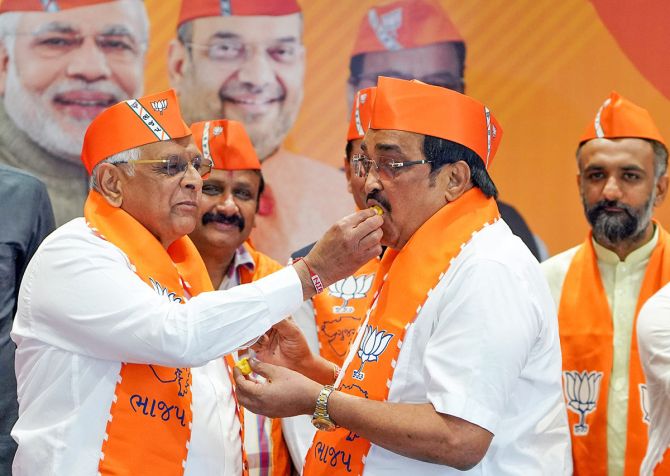
All of it could mean that Finance Minister Nirmala Sitharaman's last full Budget before the elections, due in February 2023, has to be more populist and more realistic, not in terms of what it can do for the nation's economy but how many thousand/lakh votes each measure could 'buy' for the BJP.
There needs to be no discourse on what is good governance. What the people feel good about the government is what good governance is all about in an electoral democracy -- in whichever hemisphere it is situated.
At the end of the day, Gujarat voted Modi. It voted the 'son of the soil', who was taking big hits from the Opposition across the country, and the international media and at times, governments.
In their eyes, even as he was as much a doer as public speaker par excellence, he was fighting such adversaries with his back to the wall. That needed to be challenged, that needed change. The people of Gujarat rose like one voice. Or, that is at least one perception.
In 2004, the ruling BJP-National Democratic Alliance's very catchy 'India Shining!' campaign just did not work. Rival Congress party/Sonia Gandhi's 'Aam Aadmi' did the trick.
In 2014, Modi's 'Achche Din' worked for the party and the nation. Like with UPA-II, or for then prime minister Manmohan Singh in 2009, the nation has now given Modi a second five-year term, to live up to the hopes he had kindled and the promises he made through the previous five years.
Dr Singh did not measure up, so he and his party had to go -- and almost for good. It may not be as bad as yet for Modi and the BJP, but they are on notice -- mend, or face the music.
Unless often misunderstood, the Indian voter is unflattering and selfish.
As a youth leader of the Jana Sangh, the forerunner to the BJP, Modi should know how the voter punished the Emergency regime of Indira Gandhi, despite her autocracy of the period overnight ensured that food prices and availability was to the people's liking, trains ran on time, and there was absolutely no lower and middle-level corruption in government offices across the country.
What more, bank and insurance staff behaved -- and there were no strikes, led by political parties or trade unions, unlike in the preceding years of the seventies.
Across the country, the rhythm of trade union and student union activities hit a new low, from which they have not been able to climb back.
In retrospect, people seemed to have been happy for all that and more, but they were quickly satisfied to the point of satiation that they wanted more -- liberty and freedoms that were denied to them. Including Indira Gandhi and 'crown prince' Sanjay Gandhi, they all had to go.
The comparison should stop there. Rather, there can be no comparison between the Emergency era Indira Gandhi and present-day Modi regimes. The point is that the voter decides what he wants and what is best for him.
If through the past eight years, he voted Modi and the BJP hands down, he now seems to be reaching a point of satiation. He has begun looking for something more, something different -- as with 'Aam Aadmi' and 'Achche Din' -- but not more of the same, however!
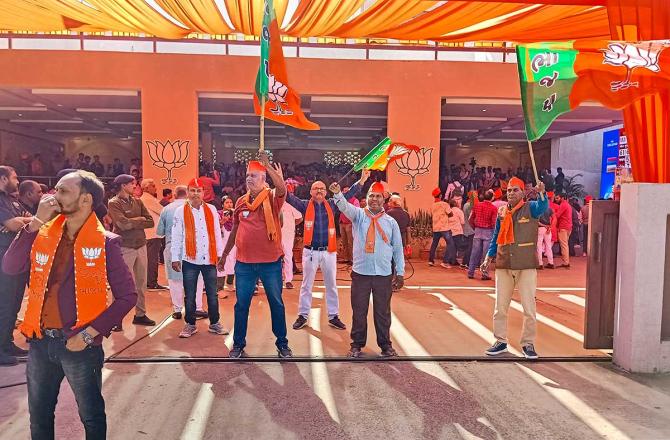
The Gujarat poll percentages are as revealing as seat shares. So are the Himachal figures. The party polled a high 52.5% in Gujarat. The Gujarat results did show how a Congress-AAP Opposition alliance too could not have done any better. Together, the two parties polled close to 12 per cent fewer votes than the BJP -- Congress 27.3% and AAP 12.9%.
Yet, there can be no denying that a split in the Opposition votes caused the Congress's tragedy in Gujarat. In around 50 seats, mainly in the tribal belt, the defeat of the Congress -- and the abysmal seat-share of the party -- owed to the AAP slicing away votes.
Likewise, if only Kejriwal and Co had focussed on the tribal seats, which they nearly ignored, they might have had a better legislative presence, it now seems. Possibly, the tribal voters were impressed by AAP's promise of better healthcare, education and government pay-out for women and youth, which other parties had offered in the past, but not any time recently.
For a ruling party, both at the Centre and in the state, with a chief minister whose name may not be still known all over, the BJP has won a record 156 seats in the 182 member Gujarat assembly -- against the previous highest of 149 for the Congress in 1985.
The fact that the AAP has failed to gather muster now means that it will be difficult for the BJP to lose even one in 26 Lok Sabha seats in 2024. All thanks to what Modi claimed post-results, 'Narendra worked hard for Bhupendra to register a record victory.'
The problem is that the party already has them all since 2019, and a full score in the state would not make a difference to the national tally, if the BJP's fortunes were to dip elsewhere in 2024. It is still a big 'if', as one swallow does not make a summer, and the Himachal-Delhi poll results need not at all reflect on national polls, where the voter priority too is different.
It is more about the leader than the party, and Modi is miles ahead of the rest of them all put together. The question is: Will it work, a third time?
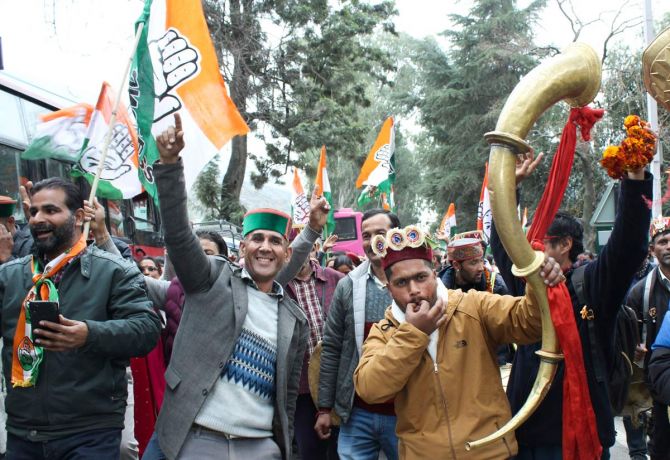
Against this, the victorious Congress could muster only 43,9% (against the BJP's 43%) in Himachal Pradesh. The 40-25 seat-share is still impressive when it comes to managing the state assembly -- at least early on -- indicating that the voter did not want the BJP to play spoiler as elsewhere through the past eight years.
The added curse could be the fact that since 2014 and more so after 2019 Lok Sabha results, the so-called party high command has lost its voice and presence, and more so after the G-23 rebellion, leading up to an 'outsider' becoming party president -- but with real power still resting with the Nehru-Gandhi family, and for good reasons.
The Congress can also have the consolation that in all four Lok Sabha seats in the state, they are in the lead when the assembly segment-wise votes are added up. But the party can spoil the broth, not just in Himachal but also for the nation as a whole if infighting of the Rajasthan variety commences and interferes with good governance, which is what the mandate is all about.
Hence, the continued relevance of the big question: Why has Modi clicked, and why is there no competition? Across the world, people in democracies especially want their leaders to be in touch and proactive.
In Third World democracies, people deify leaders and worship/hero-worship them for what is due to them anyway. Whatever the economists may say about freebies, this one characteristic has not changed. The poor call it freebies and accept them. The rich call them incentives and tax-cuts, and demand them, and get them, too.
Beyond this is the personality and the packaging. If India cried when Gandhiji, Nehru and Indira Gandhi died -- whatever their present-day critics say -- that was a reflection of the ground reality.
If in Dravidian Tamil Nadu people give up their dear lives when an Annadurai or MGR, Kamaraj or Karunanidhi or Jayalalithaa passes away, it owes to the levels to which those leaders have brought up those people during their days in office. The rest of India did not experience anything close to it, and hence has not understood it.
Yet, the BJP should not ignore AAP and Trinamool Congress attending a Parliament floor-coordination meeting called by the Congress on the eve of the Gujarat-Himachal vote-counting. Post-results, does it mean that the AAP too is ready to work with the Congress, Kejriwal and Co having claimed 'national party' status, post-Gujarat?
Of course, there is many a slip between the cup and the lip, and an uncompromising Congress can still fail aspirations for an Opposition coalition.

No single Opposition party can take on the BJP, which is only the national party with a national presence and overall dominance. For Opposition unity, which could also be the last chance for the Congress's electoral survival and possible revival, it has to begin with making the greatest of sacrifices. Not seeking the prime minister's job for itself, certainly pre-poll.
By electing an 'outsider' to the Nehru-Gandhi family as party president (even with its endorsement) in Mallikarjun Kharge may be indicative of the party's willingness to let another 'outsider', even from outside the party, to head a coalition ministry. But Kharge will be under test in his native Karnataka, where assembly polls are due along with nine others (including J-K where elections are due post-Article 370 scrapping).
But unlike in the 1996-98 era, the voter will be watching their pre-poll cooperation and behaviour before making his decision. Whether it was victory for the BJP's 'Vote for Stability' call in 1998, or the post-Janata 1980 reverse-sweep by Indira Gandhi and the Congress, it all owed to their respective rivals' inability and unwillingness to work cohesively and with a purpose.

Yet, that would leave an Opposition alliance (if they are still able to manufacture one), without a face to take on Modi, the nation's single most recognisable and popular face.
If the BJP is able to make it into yet another personality-battle in 2024, the party may still have a bigger chance. If as in 2004, the Opposition is able to take personalities out of the contest -- not only theirs, but also that of the BJP rival -- and make their election agenda and slogan speak for themselves, then, it may even out during the shorter run-up.
It suits the Opposition to go into the election without a face, yes. Rahul Gandhi, who still remains the face of the Congress party, whatever be Kharge's designation and even powers, is not a fighter. He lacks the 'killer instinct' that Modi has in abundance -- whether it was the latter slaying Keshubhai Patel in native Gujarat in the forgotten past, or national-level mentor Lal Kishenchand Advani in the forgettable past. What more, Gujarat's Patel community voters are now celebrating Modi as their own man.
It is not that Rahul and others like AAP's Kejriwal and TMC's Mamata Banerjee are not as hard-working as Modi is. They exude sincerity and hard work, but Modi alone is a fountain of energy, with which the average television news viewer is able to 'connect' even from his drawing room (and without seeing him once).
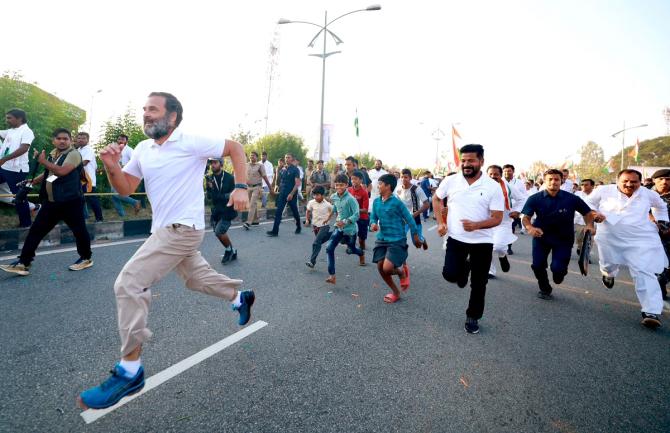
Unless Lady Luck smiles on him a second time, the PM gaddi might have passed by Rahul, already. He had the best of chances if he had stepped into Manmohan Singh's shoes as the party's prime ministerial candidate in 2009, if the former was as obliging as the BJP rival and the anti-Congress media, both traditional and social, made him out to be, five years later in 2014.
It would have been even better, if and if only Rahul had joined the Singh government in 2004, as a minister without portfolio, so as to be attached to the PM's office and learnt the ropes. He shied away from responsibility when it came his way. Today, whether he likes it or not, the PM's job does not want him. Or, so it seems.
No, it is not about luck and providence, to be fair. Though Rajiv Gandhi, and in a way, even Indira Gandhi might have been 'imposed' on the party and the nation, they stood up and measured up. Between them, Rajiv's lack of exposure showed, and he failed the party in 1989, five years after being swept into power by the sympathy wave that came with the Indira Gandhi assassination in 1984.
Indira Gandhi's experience stood with her, whether as Nehru's aide or as a short-stint minister under his successor Lal Bahadur Shastri. Unlike his father, Rahul had everything going for him, if only he had readily tutored under Manmohan Singh. He did not -- and the party, having cast all its votes and faith in him, was the one that lost out the most.
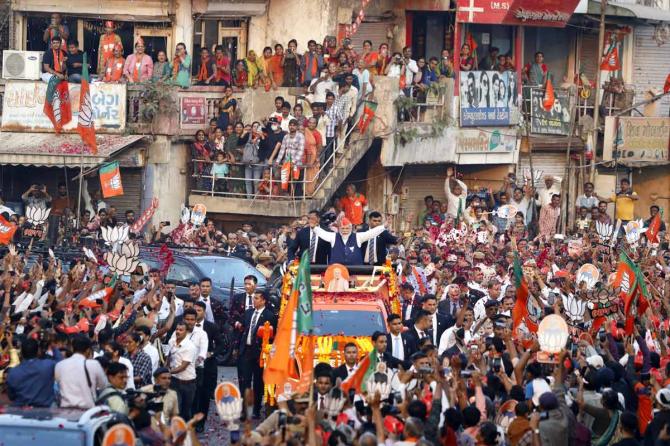
Yes, even before his time, Modi and the BJP are products of the new generation, and are able to 'connect' with the masses. Rahul, who again, belonged there, failed, because his party still lived in the past -- and would not let him break loose. Not that he too wanted it that way, having been tutored as the natural heir to a throne, which was not really his, by birth alone. That way, Rahul's Bharat Jodo Yatra may be too little, too late!
But over time, the new generation voters also grow old, but oftentimes the party and the leader that they thought had grown with, remain where they had commenced. This has also been the bane of the Indian National Congress and the Nehru-Gandhi family.
The voter is also becoming increasingly aware of and alive to the BJP's social media out-reach -- something that the party taught him.
Take, for instance, the way the BJP celebrated Gujarat, and Modi visited the party office the day results were declared, to make his own declarations. That might have stolen the Congress and other Opposition parties their due in media space and time, but the voter is sitting tight on the sidelines watching, unmoved and unconcerned.
But then, for the BJP, like with the Congress and others in politics, old habits and thinking die hard!
N Sathiya Moorthy, veteran journalist and author, is a Chennai-based policy analyst and political commentator.

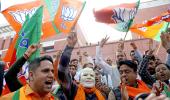

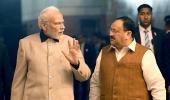







 © 2025
© 2025